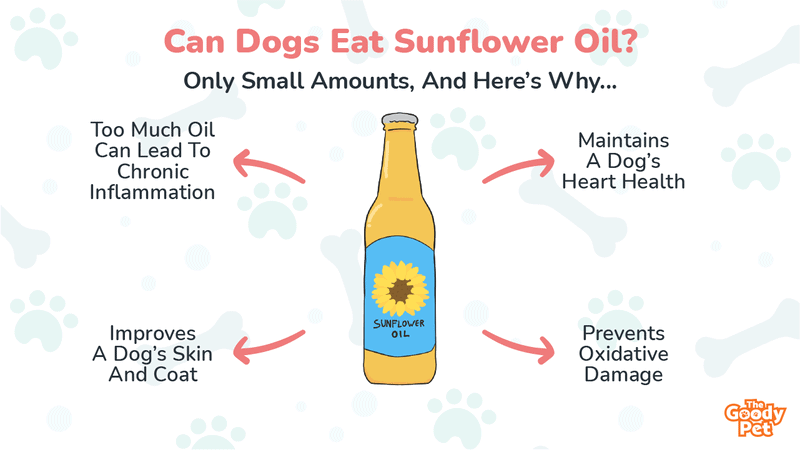A quick search online could quickly make you decide not to feed your furry friends any oil. Several opinions about adding oil to dog food seem all doom and gloom. But there are a couple of oils that are great sources of certain minerals and vitamins for dogs. Could sunflower oil be among them? Can dogs have sunflower oil?
You can give dogs small amounts of sunflower oil, but you must do so with caution. Ensure not to give dogs oil in excess or too frequently in their meals. Also, there are lots of benefits your Fido would derive from taking this oil. One notable benefit is a healthier coat and skin.
Now that you know your dog can have sunflower oil, which ways can you introduce oil to them, and what proportion is safe? If you’re skeptical about letting your canine friend have some of this oil, read on to clear your doubts. First, let’s explore the benefits of sunflower oil for your furry friend.
What Does Sunflower Oil Do For Dogs?

Depending on how you feed your dog sunflower oil, in terms of quantity and frequency, the effects on your furry friend can be either positive on negative.
While sunflower oil is highly sort after and included in many manufactured dog foods due to its unique properties, there are also reasons for concern. These may appear as conflicting views, but a quick examination of what makes sunflower safe, the benefits of feeding it to dogs, and what’s wrong with it would put the matter to rest.
Is Sunflower Oil Good For Dogs?
Sunflower oil is not only ideal for dogs, but it is also one of the healthiest oils and is recommended for doggies.
First, sunflower oil is a preferable choice in making dog food because it can withstand high heat without altering its fatty composition or reactions, which could make the oil toxic. This heat tolerance is especially necessary when preparing dog food.
Also, unlike many alternatives, sunflower oil is low in saturated fat. One of the dangers of including oil in dog food is that most contain saturated fat, which can increase dogs’ cholesterol levels. Sunflower oil is, fortunately, rich in polyunsaturated fats (PUFAs) and monosaturated fatty acids (MUFAs). These two lipid types are healthy and safe for dogs to process.
Sunflower oil contains PUFAs, namely omega-3 and omega-6. These are desirable for reducing cholesterol and triglycerides in your dog’s blood.
Benefits Of Sunflower Oil For Dogs

Sunflower oil has many benefits for dogs. It can boost their immunity, maintain heart health, and improve skin and coat conditions, to mention a few. Let’s examine these benefits in detail.
Boosts Dogs’ Immunity
Sunflower oil contains omega-6 fatty acids, and when applied in the right amount, it helps maintain the kidney and liver, the two frontline immune organs.
Maintains Heart Health
Sunflower oil comprises linoleic acid, a polyunsaturated fat, and oleic acid, a monounsaturated fat. These two lipids help reduce the soft waxy substance known as “cholesterol,” which is hazardous to the heart.
Improves Skin And Coat
Feeding your dogs sunflower oil helps keep the fatty part of their skin, called “epidermal cells,” in adequate proportion. Your furry friends store these fatty acids in their skin to provide fluidity and flexibility.
Also, sunflower oil is rich in linoleic acid (an omega-6 fatty acid), an essential nutrient for maintaining a healthy dog coat. Vets report that certain skin conditions in dogs result from a lack of this fatty acid. Such conditions include dandruff, thin hair, discolored hair, increased shedding, and poor healing.
Meanwhile, the generous presence of vitamin E (an antioxidant) in sunflower oil is good for your dog’s coat. Vitamin E helps protect dogs’ skin and maintains the coat’s shine.
Prevents Oxidative Damage
Dogs need antioxidants to prevent oxidative stress, which results from the natural antioxidant system’s inability to counteract the free radicals produced in the body.
Thankfully, sunflower oil contains vitamin E, an antioxidant that neutralizes free radicals. As a result, sunflower oil is ideal for preventing and curing problems associated with incomplete oxidation in dogs.
Controls Calcium
Sunflower oil contains vitamin K, which helps blood clotting, facilitates calcium absorption into the bones, and prevents calcium deposits into vital organs, such as the heart, arteries, and muscles.
What’s Wrong With Sunflower Oil?
The primary concern with sunflower oil is the high omega-6 and omega-3 ratio.
Canine specialists recommend between 5:1 and 10:1 for your furry friend. Sunflower oil has a proportion of 40 to 1, which is unbalanced to achieve good canine health. As a general rule, the lower the omega-6 to omega-3 fatty acid ratio, the better it is for canines.
Giving too much sunflower oil to dogs can lead to chronic inflammation in your canine’s body. Uncontrolled, the inflammation could degenerate into other diseases, such as arthritis, cardiovascular diseases, bowel conditions, imbalances in the immune system, and cancers.
Hence, you should ensure sunflower oil is not the primary means of your dog’s fatty acids. Serve your furry friend meals rich in omega-3 acids to reduce the disparity in ratio with omega-6 acids.
Can I Put Sunflower Oil In My Dog’s Food?

A small amount of sunflower oil would make a great addition to your dog’s food.
Most dogs wouldn’t lick up oil, especially as a stand-alone serving. So adding sunflower oil to your dog’s food is the best way to include it in their diet.
Also, it would be better to mix the oil with a home-cooked meal, such as fish, for your canine friend. That would ensure you control the lipid content, as food from stores may already contain some oils.
Can I Give My Dog Sardines In Sunflower Oil?
Dogs can eat sardines in sunflower oil in limited quantities. Sardines are oil-rich fishes that are healthy for your dog. They contain omega-3s and other heart-friendly supplements for dogs.
But adding sunflower oil to sardines would definitely increase the lipid content. Then, it is common knowledge how toxic lipids are to dogs when given in excess. Dogs risk obesity and pancreatitis, to mention a few consequences when eating too much fat.
Hence, try draining oil from the sardine as much as you can before adding a little quantity of sunflower oil. That should reduce the amount of fat Fido ingests. Also, keep the serving to a few sardine pieces to control the calorie and fat intake.
Can Dogs Have Tuna In Sunflower Oil?
Dogs should not eat tuna in sunflower oil. But if you give your dogs this combo, only do so occasionally and in small amounts.
The concern regards tuna fish, which many dog experts do not consider suitable for your furry friend. That is because tuna fish has the highest probability of containing mercury than any other fish.
Hence, while sunflower oil is healthy for your dog, do not risk your dog’s health by serving oil with any meal, such as tuna, that increases your dog’s chances of mercury poisoning.
Can Dogs Eat Canned Mackerel In Sunflower Oil?
Serving canned mackerel to dogs is not a bad idea if served in small amounts and only occasionally.
Mackerel makes an excellent addition to your Fido’s diet as a great source of omega-3, vitamin B12, vitamin D, and amino acids. Serving sunflower oil with mackerel will also supplement the omega-3 acids, which are very low relative to the omega-6 acids in sunflower oil.
However, mackerel already contains a lot of oil and fat. Watch how much sunflower oil you add, and avoid serving these nutrients in excess to your dog. Also, serving mackerel in sunflower oil raises fat and oil consumption in your dog’s food, increasing the chances of diarrhea.
How Much Sunflower Oil Can A Dog Have?
Half a teaspoon of sunflower oil is enough for small dogs, a full spoon for medium-sized dogs, and no more than two teaspoons per day for large dogs.
A teaspoon of sunflower oil contains about 8 grams of omega-6 fatty acids. The intention is to control the amount of this fatty acid your dog intakes since it is available in other pet food types, including whole grains, meat, and other oils. Hence, adding sunflower oil to dog food should supplement what they have already derived from their meal.
Nevertheless, while sunflower oil is great, you mustn’t overuse it in your dog’s diet. Occasionally, you should alternate its use with other cooking oils that are safe for canines. Doing this would minimize the unhealthy tendencies of feeding sunflower oil to your furry friend.
What Cooking Oils Are Safe For Dogs?

Safe cooking oil for dogs must be rich in beneficial nutrients, low in cholesterol, and not change composition when heated.
That said, some cooking oils that vets recommend for your furry friend include:
- Olive oil – It has excellent antioxidant properties, preventing oxidative stress. Also, it contains healthy fats, which lower cholesterol levels in the body.
- Coconut oil – It is rich in healthy saturated fat and great for a healthy dog coat.
- Flaxseed oil – It contains generous amounts of omega-3 and omega-6 fatty acids, reduces inflammation, and treats arthritis.





